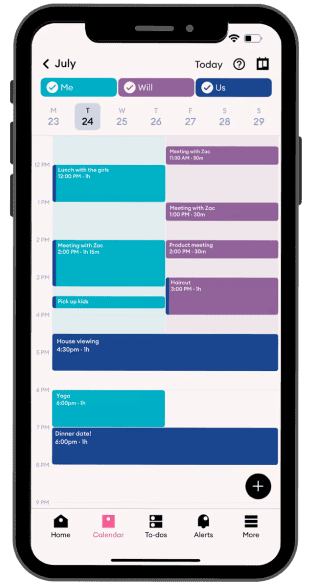
If you’re married, about to tie the knot, thinking about the moment you’ll say “I do,” or even a single pringle, you might be wondering what makes a marriage really work. It can be hard to track down all the best marriage advice from experts in one place.
While no one hands you a manual or guide when you get married, there are plenty of words of wisdom and research from the experts – relationship therapists, marriage counselors, and more.
Some of the advice might not have been on your radar, while some might seem obvious. Either way, let’s check out the best marriage advice from experts for a happy, healthy, thriving marriage.
Read More: Tough Talk: Why does sex slow down after marriage?
Establish Healthy Boundaries
We should instill boundaries in every relationship, whether it’s our relationships with coworkers, family members, or our spouse. There are emotional, physical, financial, privacy boundaries, and more that are all important to a healthy relationship[1].
For example, the most simple emotional boundary would be saying “no.” If your partner asks something of you that forces you to sacrifice your own needs, it’s okay to say no (in a kind yet assertive way). While compromising is important in relationships, always putting your partner’s needs above your own is not healthy[2].
Setting these boundaries isn’t like building big walls around you either – it’s all about getting you and your spouse on the same page on issues that are important to you, them, or you both as a couple. It can help avoid feelings of resentment and misunderstandings in the long run and show one another that you care about the other person’s needs and limitations.
Consider Both the “Me” and the “We”
To illustrate this, we can think of a musical duet playing beautiful music. In this case, the “we” is the melody and harmony created, while each “me” is each part that comes together to do so. A strong marriage very much mirrors that – a blend of both individuality and teamwork.
The “me” is about crafting your own interests, identity, and friendships outside the marriage. It’s about having a full and vibrant sense of self and working on personal growth. On the other side of the coin is the “we” – the goals, ideas, dreams, and experiences you share together. The “we” promotes interdependence, companionship, empathy, and creating memories together.
Researchon individualism and relationships shows that individualism–the “me”– and commitment–the “we”–are mutually required[3]. Both spouses should be able to experience feelings, judgment, emotions, and motivations freely for relationship satisfaction to increase[4]. Successful marriages are ones that respect and encourage each individual’s identity.
Express Your Appreciation Daily
Just a simple “thank you” or “I appreciate that” contributes greatly to relationship satisfaction and longevity. While it might feel nice for either party to hear those words, expressing your appreciation can even build a greater connection and bond between a couple – in part thanks to the body’s release of oxytocin[5].
Dr. John Gottman, psychologist and relationship expert, has even said that “a lack of appreciation can destroy a relationship”[6].
Especially once you and your partner are used to being around each other, it can be easy to forget to show that you appreciate them. But exchanging these words can certainly go a long way. Maybe your partner took the time to prepare a delicious meal or set up a bath for you after a long day at work – being vocal about your appreciation will show that you’ve noticed their genuine effort. And as a bonus, thanking your partner will help create a positive cycle of you both wanting to do nice things for each other[7].
Own Up to Your Mistakes
We all make mistakes, let our emotions run wild, and do things that don’t align with our values. That’s because we’re human. The real difference-maker is what we do after the fact. According to a study in the Journal of Family Psychology, couples who admit their faults and seek forgiveness are more likely to maintain a healthy romantic relationship[8].
While our egos might want us to “win” and avoid admitting our own faults, this can do damage to our close relationships and affect our personal growth[9]. Owning up to your mistakes can be somewhat of an art, but it all comes down to truly meaning what you say. It goes beyond saying sorry and includes acknowledging your mistake, understanding how it affected your spouse, and making a real effort to avoid repeating it.
Check In On Each Other
Life gets busy, so scheduling time to genuinely check in and connect with one another can often be an afterthought. Whether it’s work, chores, kids, personal projects, or something else, these factors can lead to overlooking your spouse’s mental and emotional needs.
Regular check-ins serve the purpose of helping you both feel more connected. It doesn’t need to be a time-consuming or grand gesture either – it could be something as simple as asking how their day was or if there’s something important on their mind. This way, you’re taking a moment to step back and be there for your partner.
Studies show providing emotional support boosts overall mental and physical health and life expectancy[10]! So no matter how hectic life gets, don’t forget to lend an ear and show true interest in your partner’s thoughts and feelings.
Read More: 6 Pieces Of Relationship Advice We Wish We’d Heard Sooner
Cupla: Bringing You Closer
With technology dominating every aspect of our lives, why not use it to lift up your relationship? Cupla is a one-of-a-kind relationship management app that can help you keep your spark alive. With the app, you can enjoy shared calendars, to-do lists and reminders, and even curated date nights that will bolster the connection between you. For couples looking to strengthen their bond in this busy world, Cupla acts as your smart assistant for a happier relationship.
Trial Cupla now for free on iOS or Android.
[3] https://pubmed.ncbi.nlm.nih.gov/31390934/
[4] https://onlinelibrary.wiley.com/doi/10.1111/j.1475-6811.2009.01231.x
[5] https://greatergood.berkeley.edu/article/item/love_gratitude_oxytocin
[7] https://compass.onlinelibrary.wiley.com/doi/abs/10.1111/j.1751-9004.2012.00439.x
[8] https://www.nbcnews.com/better/lifestyle/how-get-better-admitting-you-re-wrong-ncna1003356







